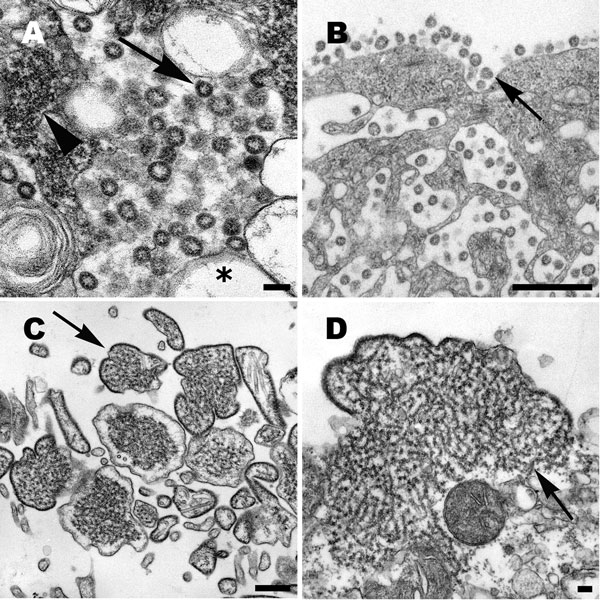Cell Culture and Electron Microscopy for Identifying Viruses in Diseases of Unknown Cause
Cynthia S. Goldsmith

, Thomas G. Ksiazek, Pierre E. Rollin, James A. Comer, William L. Nicholson, Teresa C.T. Peret, Dean D. Erdman, William J. Bellini, Brian H. Harcourt, Paul A. Rota, Julu Bhatnagar, Michael D. Bowen, Bobbie R. Erickson, Laura K. McMullan, Stuart T. Nichol, Wun-Ju Shieh, Christopher D. Paddock, and Sherif R. Zaki
Author affiliations: Centers for Disease Control and Prevention, Atlanta, Georgia, USA (C.S. Goldsmith, P.E. Rollin, J.A. Comer, W.L. Nicholson, T.C.T. Peret, D.D. Erdman, W.J. Bellini, B.H. Harcourt, P.A. Rota, J. Bhatnagar, M.D. Bowen, B.R. Erickson, L.K. McMullan, S.T. Nichol, W.-J. Shieh, C.D. Paddock, S.R. Zaki); University of Texas Medical Branch, Galveston, Texas, USA (T.G. Ksiazek)
Main Article
Figure 1

Figure 1. . . A) Cell culture isolate of severe acute respiratory syndrome coronavirus, in which virions are seen in the cisternae of the budding compartment (arrow). Also present are an inclusion of viral nucleocapsids (arrowhead) and double-membrane vesicles (asterisk). Scale bar = 100 nm. B) Coronavirus particles in cytoplasmic vesicles that appear to migrate to the cell surface. Virions are seen lining the cell membrane (arrow), a characteristic feature of this virus. Scale bar = 500 nm. C) Large, pleomorphic, extracellular Nipah virus particles (arrow), in which the viral envelope encloses the nucleocapsids. Scale bar = 500 nm. D) Nipah virus nucleocapsids (arrow) aggregate in the cytoplasm and become tightly apposed to the cell membrane as the virus begins the process of budding. Scale bar = 100 nm.
Main Article
Page created: May 20, 2013
Page updated: May 20, 2013
Page reviewed: May 20, 2013
The conclusions, findings, and opinions expressed by authors contributing to this journal do not necessarily reflect the official position of the U.S. Department of Health and Human Services, the Public Health Service, the Centers for Disease Control and Prevention, or the authors' affiliated institutions. Use of trade names is for identification only and does not imply endorsement by any of the groups named above.
